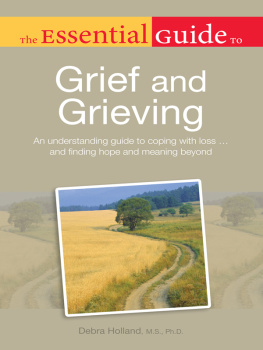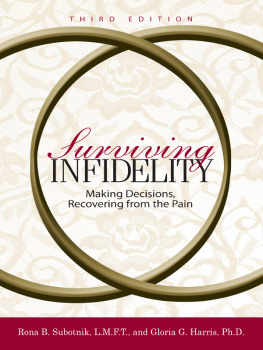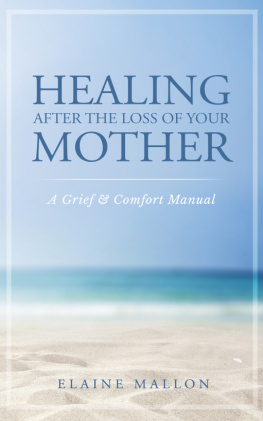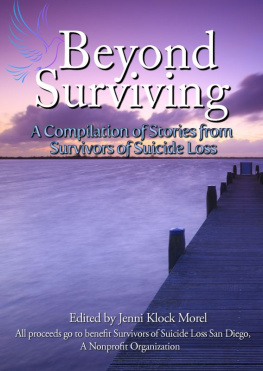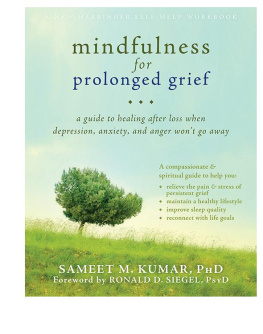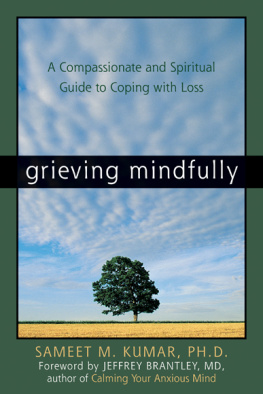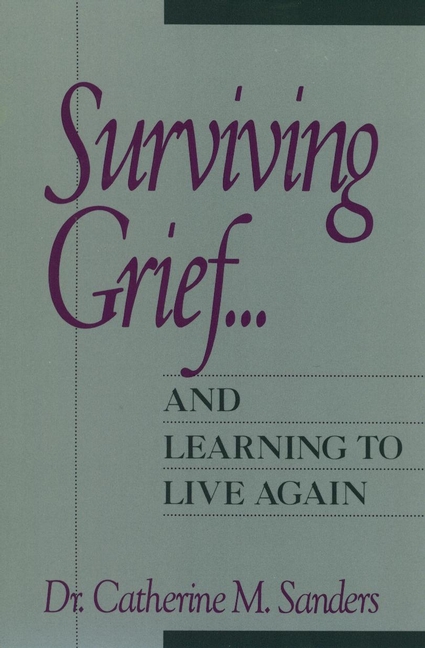
Copyright 1992 by John Wiley & Sons, Inc.
All rights reserved. Published simultaneously in Canada.
Reproduction or translation of any part of this work beyond that permitted by Section 107 or 108 of the 1976 United States Copyright Act without the permission of the copyright owner is unlawful. Requests for permission or further information should be addressed to the Permissions Department, John Wiley & Sons, Inc.
This publication is designed to provide accurate and authoritative information in regard to the subject matter covered. It is sold with the understanding that the publisher is not engaged in rendering legal, accounting, or other professional services. If legal advice or other expert assistance is required, the services of a competent professional person should be sought. From a Declaration of Principles jointly adopted by a Committee of the American Bar Association and a Committee of Publishers.
Library of Congress Catalqging-in-Publication Data
Sanders, Catherine M.
Surviving grief and learning to live again / Catherine M. Sanders.
p. cm.
Includes bibliographical references.
ISBN 0-471-53471-4 (pbk.)
1. Grief. 2. BereavementPsychological aspects. I. Title.
BF575.G7S263 1992
155.937dc20
91-43605
Dedication
I dedicate this book To the wonderful people in the Tampa Bereavement Study who, with broken hearts and spirits, willingly shared their stories with me in the hope that they could be of some help to others. My deepest gratitude goes to each one.
Preface
When I was writing Grief: The Mourning After, my earlier book for caregiving practitioners, I kept slipping into sentences that were speaking directly to grieving persons rather than to the professional caregivers. I think I had already decided that a second, more personal book, written for those who are experiencing grief firsthand, could reach and help many more people.
I've drawn from a wide variety of resources to write this second book: my own research, therapy with bereaved individuals, and my personal experience with deaths in my immediate family. A large part of the information here is based on a research project I conducted in the Tampa, Florida, area. I met with 125 bereaved individuals who had lost a spouse, a child, or a parent. I followed each person through his or her first two years of bereavement. I met with each of them several times, and we usually became good friends. Throughout the book, I refer to my research project as the Tampa Study. The information gained from this study has given me valuable insight into the course of bereavement, and it is the cornerstone for the phases of grief I describe in . I call this whole approach the Integrative Theory of Bereavement.
Most of us don't know what grief is like until we lose someone we love, and no two experiences of loss are exactly the same. The closeness to us of the person who dies; the time in his or her lifeand in ourswhen death comes; and the unique circumstances of each death all make a difference in the way we grieve and in the length of time we take to heal.
Grief's common denominator for us all, however, is pain. When we lose a dearly loved person, we feel unbearable emotional pain. There is no getting around the pain; we must move through it if we are to heal. Trying to avoid the painful emotions of grief only leads to greater problemsillness or serious chronic distress. Worst of all, avoiding the painful feelings of grief leaves us psychologically stuck where we are, unable to change and grow.
Grief is felt on many levels at the same time. Physically, the symptoms include headaches, gastrointestinal discomfort, palpitations, dizziness, and, possibly, panic attacks. Psychologically, the distress can be experienced as yearning, crying, anger, frustration, and feelings of guilt and shame. Social deprivation is another level of grief. When we lose a significant person, we experience social isolation and alienation because we see ourselves as different from others and different from ourselves before the death occurred. When our husband or wife dies, our roles in the community and in our close circle of friends can change drastically.
What heals us finally? When we actively move through the phases of grief, we work toward restoring a healthy perspective. We can't deal with grief passively; we have to participate fully.
Each of us experiences each loss of a loved one in a unique way, often depending on how close we were to the person during life and how prepared we were, together, for the reality of the person's death. Still, the best preparation cannot protect us from the intense pain that follows the loss.
My prologue is a description of my own losses, across three generations of my family. Read it, and you will understand that I do know a survivor's devastating pain.
I think it is important for you to know the level of your own pain. Draw your own Self-Profile of Bereavement by answering the questionnaire on pages 1921. Put a date at the top of your answer sheet. A few months after you finish this book and actively put into effect the help I am offering, fill out the Self-Profile of Bereavement again, and compare your results against your present score. This will give you an idea of the progress you have made toward resolving your grief.
My book explains the complete process of bereavement. As survivors, you move through five phases of grief: shock, awareness of loss, conservation/withdrawal, healing, and renewal. You're in one of those phases now. When you understand those phases, it will become easier for you to move more calmly into each new phase. You may often wonder whether you're going crazy; this book will help you to accept grief as a natural experience. You'll see your reactions as part of a normal process that you must move through, to accomplish healing and renewal. The stress you are feeling will then be greatly reduced.
In surviving the death of someone dear, we face one of life's most agonizing challenges. We have the opportunity, once we have worked through the phases of grief, to surface as a stronger, more competent, new individual. The working through takes time, energy, and a persevering heart. Many times, we feel like quitting. In these times of loneliness and defeat, our courage is at its lowest. And yet, something carries us through: something, call it what you willGod, providence, or a higher powergives us the strength to begin again. I believe that unless we can rely on some higher power to help us through the long and arduous journey of grief, we can't deal with the need to forgive, to love, or to fully belong to other important relationships.
In this book, I join the disciplines of experimental research and clinical application with spiritual dimensions. I am firmly convinced that grief deals with issues of the soul as well as emotional and physical issues. To understand the grieving process, it is important to be able to embrace all three.
My hope in writing this book is that you will understand that grief has a progressive course and that your grief will move through the steps of that course. Through all your pain, I hope to reassure you that you will survive and, in time, you will feel alive once more.
Catherine M. Sanders
Charlotte, North Carolina
April 1992
Acknowledgments
First and foremost, I want to thank all the bereaved people who have contributed their stories, their suggestions, and their enormous courage and wisdom to this book: participants in the Tampa Study, patients who allowed me to share their journey, and the many other bereaved persons I have met along the way. Their stories are all here, although I have changed their names and shifted some of the situations surrounding the deaths in order to preserve their privacy and confidentiality. I am deeply indebted to each of them.
Next page


